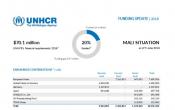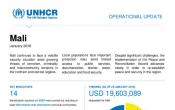Mali
Operation: Mali
Location
{"longitude":-2,"latitude":17,"zoom_level":0,"iso_codes":"'MLI'"}
By clicking on the icons on the map, additional information is displayed.
Key Figures
| 2017 year-end results | |
| 100% | of people of concern are registered in the UNHCR database |
| 100% | of local communities supported the presence of people of concern |
| 75% | of local law and policy relating to internal displacement in line with international standards |
| 5,440 | people received multipurpose cash grants |
| 550 | refugees repatriated from Mali to their countries of origin |
| 2018 planning figures | |
| 100% | of refugee households have basic needs met through multipurpose cash grants or vouchers |
| 100% | of refugees will have returned voluntarily |
| 100% | of returnees will have their national rights re-established |
| 80% | of refugees are involved in combatting sexual and gender-based violence through prevention and sensitization |
| 2,500 | returnees and vulnerable host community members will have their protection monitoring incidents reported |
Latest Updates
People of Concern
26%
Decrease in
2016
2016
| 2016 | 100,247 |
| 2015 | 135,816 |
| 2014 | 291,615 |

[["Refugees",17512],["Asylum-seekers",301],["IDPs",36690],["Returned IDPs",35986],["Returned refugees",9758]]
Loading ...
Mali
< Back
2017
{"categories":[2013,2014,2015,2016,2017,2018],"budget":[32.21080715,69.58910338,67.860516734,49.1719132,41.007531648,20.84150673],"expenditure":[17.59712543,20.65237349,14.86664134,13.37227655,13.34678074,null]}
{"categories":[2013,2014,2015,2016,2017,2018],"p1":[5.21061354,20.45192283,48.924988312,27.08867361,13.625051768,10.45396507],"p2":[null,null,0.12311877,1.06694838,0.956948,null],"p3":[null,null,10.754399482,17.77571883,25.28018688,9.26252293],"p4":[27.00019361,49.13718055,8.05801017,3.24057238,1.145345,1.12501873]}
{"categories":[2013,2014,2015,2016,2017,2018],"p1":[2.8587129,11.38623867,9.3844582,7.040851,5.73030234,null],"p2":[null,null,0.10197148,0.57564893,0.75438523,null],"p3":[null,null,3.67058966,4.66259468,6.39414574,null],"p4":[14.73841253,9.26613482,1.709622,1.09318194,0.46794743,null]}
Loading ...
CHOOSE A YEAR
- 2014
- 2015
- 2016
- 2017
- 2018
Operational context
The security situation in the north and centre of the Mali remained a major concern despite the efforts made by both the Government of Mali and the international community since 2012. According to the World Bank, the economic performance of the country remained satisfactory, with a sustained growth of 5.3 per cent in 2017, despite the unstable socio-political situation. The insecurity in region limited UNHCR’s access to people of concern in many localities in North.Due to the increasing insecurity, in July 2017, the G5 Sahel countries (Burkina Faso, Chad, Mali, Mauritania and Niger) decided to form a joint force that focuses on combatting terrorism across the region. The G5 Sahel operations began in the last quarter of 2017. Despite the delays in the application of the Agreement for Peace and Reconciliation (the “Bamako Agreement”), Mali continues to receive Malian returnees from Burkina-Faso, Mauritania and Niger.
Population trends
At the end of 2017 there were close to 15,800 refugees in Mali, with the majority of them being from Mauritania. Some 38,200 Malians remained internally displaced, while more than 23,200 IDPs returned to their places of origin.Furthermore, close to 5,000 Malian refugees in neighbouring countries returned to Mali in 2017, bringing the total number of returnees since 2013 to 63,100.
Key achievements
- Together with Government of Mali, UNHCR conducted three sensitisation campaigns to promote peaceful coexistence between people of concern and host communities.
- UNHCR in collaboration with the government conducted regular verification and registration of people of concern to update databases.
- UNHCR supported the Government of Mali in improving the national asylum law to make it more in line with international standards.
Working environment
With the slow implementation of the Agreement for Peace and Reconciliation in Mali, signed in June 2015, the ongoing threats of terrorism and criminality continue to hinder humanitarian access to people of concern in the north and necessitate specific risk-reduction measures for UNHCR personnel on missions in the field. The risk of renewed intercommunal violence also remains high, with the potential to impact voluntary returns of Malian refugees and internally displaced people (IDPs). Despite the volatile security situation, Mali continues to welcome asylum-seekers and refugees from other countries. The Government of Mali remains in favour of the naturalization and integration of long-staying refugee populations, notably Mauritanian refugees. This is expected to reduce the number of refugees in the country by 2017.Key Priorities
In 2017, UNHCR will focus on:• facilitating durable solutions for refugees in protracted situations by promoting access to socio-economic integration, legal documentation and naturalization;
• assisting urban refugees and asylum-seekers through cash-based interventions (CBIs), improved documentation, education and sexual and gender-based violence (SGBV) prevention;
• supporting preparations for the voluntary and sustainable return of Malian refugees and IDPs. including by planning activities in the areas of CBIs, self-reliance, SGBV prevention, documentation, protection monitoring and peaceful coexistence;
• identifying stateless people and people at risk of statelessness, and supporting the Government to revise laws in order to prevent and reduce statelessness in Mali.
Should there is a decrease in budget for UNHCR’s operation in Mali, this will have a negative impact on people of concern to the Office, particularly Malian returnees who will not be able to be provided with reintegration assistance.

